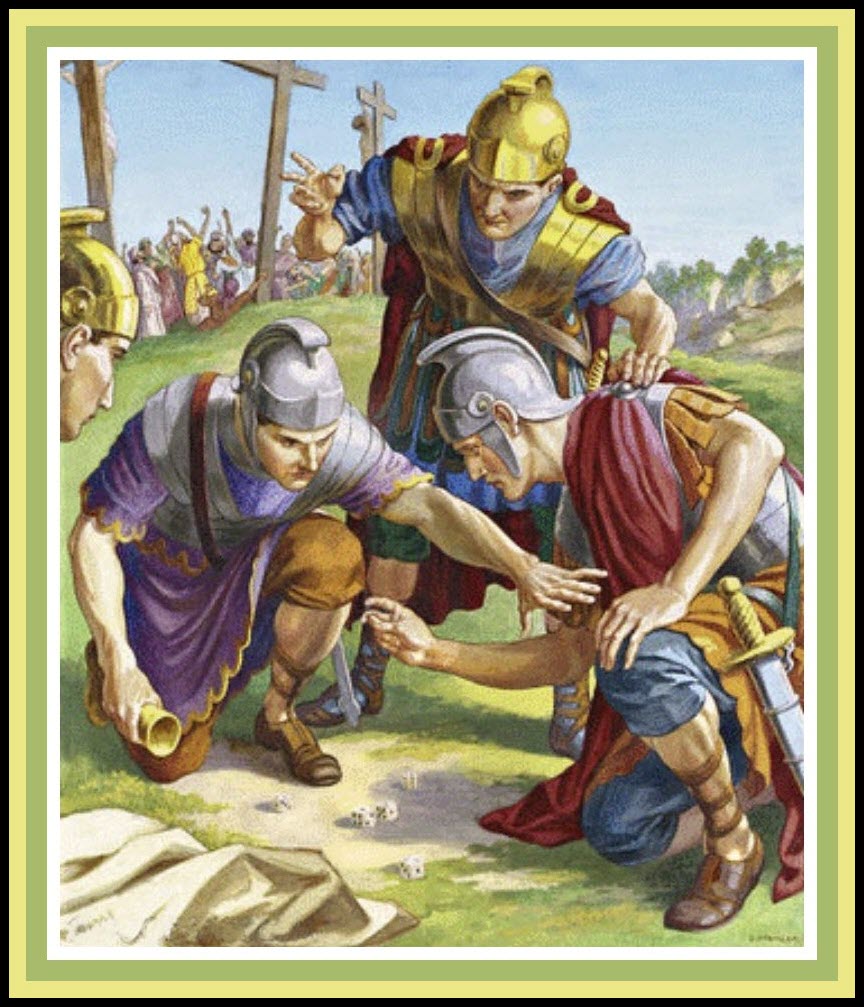

“WHY DIDN’T THE SOLDIERS REND
JESUS’ CLOTHES?”
A: God
wouldn’t let them so as to fulfil the prophecy
of Psalm 22:18
“Then the
soldiers, when they had crucified Jesus,
took his garments, and made four parts, to every soldier a part; and
also his
coat: now the coat was without seam, woven from the top
throughout. They
said therefore among themselves, Let us not rend it, but cast
lots for
it, whose it shall be: that the scripture might be fulfilled,
which
saith, They parted my raiment among them, and for my vesture they
did cast
lots.” (John 19:23-24)
Funny
isn’t it, how God can make an unsaved
man obey him. Here’s the soldiers thinking that they were making the
decision
not to rend the coat of Jesus but it was actually God making them do
that … and
they wouldn’t have had a clue about the Old Testament scripture. Would
they be
saying “Hey Achaius and Adolphus, we must not rend Christ’s vesture so
we can
fulfil prophecy.” Yes? Pigs can fly too!
Now the
rending of clothes or material in the Bible
has significance and meaning. It can mean death, separation,
a ceasing
of a dispensation or a change.
In the
Bible ‘rending’ a garment could mean a
physical death
“And Moses
said unto Aaron, and unto Eleazar and unto Ithamar, his sons, Uncover
not your
heads, neither rend your clothes; lest ye die, and lest wrath
come upon
all the people: but let your brethren, the whole house of Israel,
bewail the
burning which the LORD hath kindled.” (Leviticus 10:6)
For
lighting strange fire (Leviticus 10:1), God
killed the sons of Aaron as they were not worthy to have clothes rent
on their
behalf, although bewailing would be acceptable, and any son that would
do any
rending would die.
Moses was
careful not rend his clothes
(Exodus
39:23) “And there was an hole in the midst
of the robe, as the hole of an habergeon, with a band round about the
hole, that
it should not rend.”
For Moses
to rend his habergeon, either consciously
or unconsciously, it would not represent an unrendable God …
that is,
God is not made up of torn parts and neither is he able to be rent. We
are
reminded that Christ’s kingdom of heaven on earth as represented in one
of the
thirteen parables, is a pearl (Matthew 13:46). Indeed, unlike other
gems and
stones that can be cut, sawn or divided, and still remain as a valuable
gem and
stone, a pearl ceases to be a pearl should it be subjected to any of
these
treatments. A pearl will be ruined and worthless should it be cut in
two or
interfered with in any way.
For Moses
to have a God representing garment that would
have any tear, abrasion or division in it, would be akin to a worthless
pearl
that had been ruined by man’s neglect or interference.
In
the Bible ‘rending’ a garment could mean a
spiritual death
“And he that
is the high priest among his brethren, upon whose head the anointing
oil was
poured, and that is consecrated to put on the garments, shall not
uncover his
head, nor rend his clothes;” (Leviticus 21:10)
A rending
of a high priest’s clothing would signify
the end of his priesthood. This could happen and did happen (Matthew
26:65) but
the high priest in Matthew’s account was unconsciously fulfilling God’s
purpose, with an action that signifying a dual purposes – the ceasing
of his
priesthood and the transferring of his high priest office to Christ.
What did
the rent veil in the temple signify?
“And the veil
of the temple was rent in
twain from the top to the bottom.” (Mark 15:38)
There
would be no more intact curtain of a physical
tabernacle under Moses … it was to be done away with. The Jewish
dispensation
under Moses was destroyed from top to bottom … it emanated from God in
the
uppermost to Israel down below and not the other way around. God
decided the
end of this dispensation not man. If the curtain was rent from bottom
to top,
this would signify that man was in control of ending this dispensation.
Was Christ
issued forth or rent?
Christ was
not rent from the Godhead but was
issued forth as a son (2Kings 20:18). An issue is not a
rending
(Hebrews 1:3) as it is an expressing or something from something else.
A
rending of the Godhead would have meant the end of God. He cannot be
divided as
he is one God of three persons … and he will always be one God and not
a God of
separate parts. He will always remain eternal (Hebrews 1:11).
Back
to the top …
“WHY DIDN’T THE SOLDIERS REND
JESUS’ CLOTHES?”
should be
“WHY COULDN’T THE SOLDIERS REND
JESUS’ CLOTHES?”
God would
not allow any rending of his clothes by
anyone, Old Testament or New, let alone by men of an unsaved world. It
was impossible
for the soldiers to rend the coat.
Now, Dear
Reader, what does God require of you having
said all this?
“And rend
your heart, and not your garments, and turn unto the LORD your God:
for he
is gracious and merciful, slow to anger, and of great kindness, and
repenteth
him of the evil.” (Joel 2:13)
Of course
in the upcoming tribulation. God will
enact his purposes upon Israel, but in the meantime, before ‘the
rapture’, God
would require rending of all unsaved hearts.
As the
scripture says
“And
Samuel said, Hath the LORD as great delight in burnt offerings and
sacrifices, as in obeying the voice of the LORD? Behold, to obey is
better
than sacrifice, and to hearken than the fat of rams.” (1
Samuel
15:22)
Harley Hitchcock
www.
AustralianBibleMinistries
.com